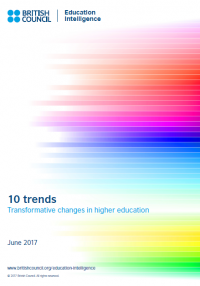The third week of November is International Education Week 2017. To mark the occasion, the WFCP will be sharing reports, opportunities, and highlights of the benefits of international co-operation and studying abroad during the week of November 13-17.
 Trends can play an important role in developing policy. As international education continues to gain traction, trends in the field determine how students, institutions and policymakers respond and ensure that professional and technical education and training (PTET) meets needs. The British Council’s June 2017 report, 10 Trends Transformative changes in higher education (available for download here), looks at trends in international education. Professor Rebecca Hughes, the British Council’s Education Director notes that the growing number of trends in international education are becoming more nuanced, due in part to the changing nature of geopolitics, economic and workplace demands, and individual priorities.
Trends can play an important role in developing policy. As international education continues to gain traction, trends in the field determine how students, institutions and policymakers respond and ensure that professional and technical education and training (PTET) meets needs. The British Council’s June 2017 report, 10 Trends Transformative changes in higher education (available for download here), looks at trends in international education. Professor Rebecca Hughes, the British Council’s Education Director notes that the growing number of trends in international education are becoming more nuanced, due in part to the changing nature of geopolitics, economic and workplace demands, and individual priorities.
The 2017 report follows previous iterations of the British Council’s trend reports. As in its 2013 report, the first megatrend identified is the shift in global demographics. Populations in many countries around the world are ageing, while fertility rates fall. The global population is expected to grow to 11.2 billion people by the close of this century with much of the growth on the African continent. Demographic shifts will not only impact institutions as the youth cohort declines, but also impact the programs of study. For example, the report notes that in many Asian countries, programs around ageing and geriatrics is growing.
Both the 2013 and 2017 report highlight the importance of national governments in international education. The 2013 report notes that changes to federal governments in India, Myanmar, and Australia had positive impacts on international cooperation and opportunities. The recent report notes that international strategies are increasingly being developed at a national level, while the funding decisions made by federal governments significantly impact the ability of institutions to engage in international education.
Trends in professional and technical education was the theme at UNESCO’s 2017 International Conference on Technical and Vocational Education and Training in China. The conference outcome statement updated the 2012 Shanghai Consensus with recommendations for member nations to institute policies that would increase international mobility and international cooperation in order to achieve quality education in PTET.